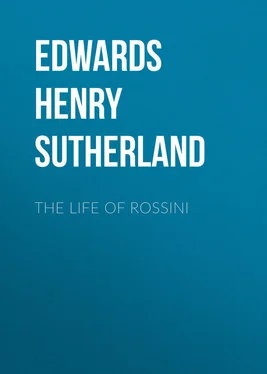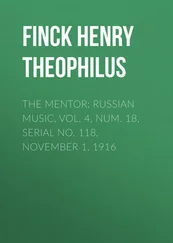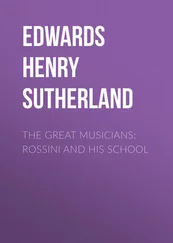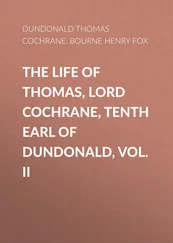Henry Edwards - The Life of Rossini
Здесь есть возможность читать онлайн «Henry Edwards - The Life of Rossini» — ознакомительный отрывок электронной книги совершенно бесплатно, а после прочтения отрывка купить полную версию. В некоторых случаях можно слушать аудио, скачать через торрент в формате fb2 и присутствует краткое содержание. Жанр: foreign_antique, foreign_prose, на английском языке. Описание произведения, (предисловие) а так же отзывы посетителей доступны на портале библиотеки ЛибКат.
- Название:The Life of Rossini
- Автор:
- Жанр:
- Год:неизвестен
- ISBN:нет данных
- Рейтинг книги:4 / 5. Голосов: 1
-
Избранное:Добавить в избранное
- Отзывы:
-
Ваша оценка:
- 80
- 1
- 2
- 3
- 4
- 5
The Life of Rossini: краткое содержание, описание и аннотация
Предлагаем к чтению аннотацию, описание, краткое содержание или предисловие (зависит от того, что написал сам автор книги «The Life of Rossini»). Если вы не нашли необходимую информацию о книге — напишите в комментариях, мы постараемся отыскать её.
The Life of Rossini — читать онлайн ознакомительный отрывок
Ниже представлен текст книги, разбитый по страницам. Система сохранения места последней прочитанной страницы, позволяет с удобством читать онлайн бесплатно книгу «The Life of Rossini», без необходимости каждый раз заново искать на чём Вы остановились. Поставьте закладку, и сможете в любой момент перейти на страницу, на которой закончили чтение.
Интервал:
Закладка:
Nor must the orchestra be forgotten, which Rossini enriched on this occasion by the introduction of instruments previously unknown. In one movement the musicians, at the beginning of each bar, had to strike the tin shades of the candles in front of them; when the sound extracted from these new “instruments of percussion,” instead of pleasing the public, so irritated it, that the audacious innovator, hissed and hooted by his audience, found it prudent to make his escape from the theatre.
This practical joke in music was one which few composers could have afforded to make; but Rossini had to choose between a bad joke and a bad opera, and he preferred the former.
CHAPTER II
ITALIAN OPERA UNTIL “TANCREDI.”
THE first opera of Rossini’s which became celebrated throughout Europe was “Tancredi,” which in the present day seems just a little old-fashioned. In regard to the recitatives and their accompaniments “Tancredi” is indeed somewhat antiquated. But it was new, strikingly new, in the year 1813, when Mozart’s great operas had scarcely been heard out of Germany, and when, moreover, no one thought of comparing Rossini’s works with any but works by other Italian composers. It was very unlike the serious operas of Rossini’s Italian predecessors, and, in the opinion of many who admired those operas even to prejudice, was full of culpable innovations.
When Rossini began to write for the stage, the lyric drama of Italy was divided by a hard line into the serious and the comic; and comic opera, or rather opera buffa, was, musically speaking, in a much more advanced state of development than opera seria. The dialogue, especially in serious opera, was carried on for interminable periods in recitative. Choruses were rarely introduced; and concerted pieces, though by no means unknown, were still reserved, as a rule, for the conclusion of an act.
The singers were allowed great liberty of adornment, and treated the composer’s melodies as so much musical canvas, to be embroidered upon at will.
The orchestra was in a very subordinate position; the harmony was meagre, the instrumentation mild – many instruments, that were afterwards employed prominently and with great effect by Rossini, being kept in the background or entirely ignored.
Clarinets, for instance, were only admitted into Italian orchestras on condition of being kept quiet; while bassoons were used only to strengthen the basses. Brass instruments, with the exception of horns, were all but proscribed; and some of the brass instruments used by all composers in the present day – opheicleids, for instance, cornets, and all the family of saxhorns – were unknown.
Rossini did not stop, in the way of orchestrations, at “Tancredi;” and the drums and trumpets of the “Gazza Ladra” overture, the military band of “Semiramide,” the sackbuts, psalteries, and all kinds of musical instruments employed in his operas for the French stage, shocked the early admirers of “Tancredi” as much as the innovations, vocal and instrumental, in “Tancredi” had shocked those who cared only for the much simpler works of Paisiello and Cimarosa. Thus we find Stendhal complaining that in “Otello,” “Zelmira,” and above all “Semiramide,” Rossini, in the matter of orchestration, had ceased to be an Italian, and had become a German – which, in the opinion of Stendhal and his Italian friends, was about as severe a thing as could be said.
Lord Mount Edgcumbe in his “Reminiscences of the Opera” gives a fair account of the reforms introduced by Rossini into the operatic music of Italy, which is interesting as proceeding from an old operatic habitué to whom these changes were anything but acceptable. It would be a mistake to suppose that Rossini’s operas encountered formidable opposition anywhere; and in England, as in France, those musicians and amateurs who, here and there, made it their business to decry them, did so with the more energy on account of the immense favour with which they were received by the general public.
“So great a change,” says Lord Mount Edgcumbe, “has taken place in the character of the (operatic) dramas, in the style of the music and its performance, that I cannot help enlarging on that subject before I proceed further. One of the most material alterations is that the grand distinction between serious and comic operas is nearly at an end, the separation of the singers for their performance entirely so. 4 4 The serious opera consisted of the following persons: The soprano or primo uomo [ homo , but not vir ], prima donna (generally a mezzo soprano or contralto ) and tenor; the secondo uomo (soprano) seconda donna and ultima parte (bass). The company for the comic opera consisted of the primo buffo (tenor) prima buffa , buffo caricato (bass), seconda buffa and ultima parte (bass). There were also the uomo serio and donna seria , generally the second man or woman of the serious opera.
Not only do the same sing in both, but a new species of drama has arisen, a kind of mongrel between them called semi seria , which bears the same analogy to the other two that that nondescript, melodrama, does to the legitimate drama and comedy of the English.”
Specimens of this “nondescript” style are of course to be found in Shakspeare’s plays and in Mozart’s operas; but let Lord Mount Edgcumbe continue his perfectly intelligible account of Rossini’s reforms.
“The construction of these newly invented pieces,” he proceeds, “is essentially different from the old. The dialogue, which used to be carried on in recitative, and which in Metastasio’s operas is often so beautiful and interesting, is now cut up (and rendered unintelligible if it were worth listening to) into pezzi concertati , or long singing conversations, which present a tedious succession of unconnected, ever-changing motivos having nothing to do with each other: and if a satisfactory air is for a moment introduced which the ear would like to dwell upon, to hear modulated, varied, and again returned to, it is broken off before it is well understood, by a sudden transition into a totally different melody, time and key, and recurs no more; so that no impression can be made or recollection of it preserved. Single songs are almost exploded … even the prima donna, who would formerly have complained at having less than three or four airs allotted to her, is now satisfied with one trifling cavatina for a whole opera.”
Rossini’s concerted pieces and finales described are not precisely a “tedious succession of unconnected, ever-changing motivos;” but from his own point of view Lord Mount Edgcumbe’s account of Rossini’s innovations is true enough.
It seems strange, that in the year 1813, when Rossini produced “Tancredi,” the mere forms of the lyric drama should have still been looked upon as unsettled. For though opera could only boast a history of two centuries – little enough considering the high antiquity of the spoken drama – it had made great progress during the previous hundred years, and was scarcely the same entertainment as that which popes, cardinals, and the most illustrious nobles in Italy had taken under their special protection in the early part of the seventeenth century. No general history of the opera in Europe can well be written, for its progress has been different in each country, and we find continual instances of composers leaving one country to visit and even to settle in another, taking with them their works, and introducing at the same time and naturalising their style. But its development in Italy can be followed, more or less closely, from its origin in a long series of experiments to the time of Scarlatti, and from Scarlatti (1649) in an unbroken line to Rossini.
Indeed, from Scarlatti to the immediate predecessors of Rossini, the history of the development of the opera in Italy is the history of its development at Naples; and Rossini himself, though not educated at Naples, like almost all the other leading composers of Italy, soon betook himself to the great musical capital, and composed for its celebrated theatre all his best Italian operas in the serious style.
Читать дальшеИнтервал:
Закладка:
Похожие книги на «The Life of Rossini»
Представляем Вашему вниманию похожие книги на «The Life of Rossini» списком для выбора. Мы отобрали схожую по названию и смыслу литературу в надежде предоставить читателям больше вариантов отыскать новые, интересные, ещё непрочитанные произведения.
Обсуждение, отзывы о книге «The Life of Rossini» и просто собственные мнения читателей. Оставьте ваши комментарии, напишите, что Вы думаете о произведении, его смысле или главных героях. Укажите что конкретно понравилось, а что нет, и почему Вы так считаете.












